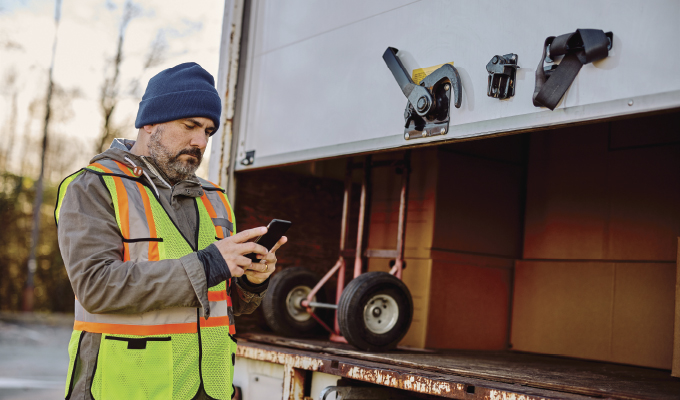Whether it’s local, state, or federal government mandates or strategic business goals, sustainability is quickly becoming a priority in the transportation sector. While every decarbonization journey shares the same goal, there are different roads to get there.
DECARBONIZATION JOURNEY
A survey recently conducted (May 2023) by Gladstein, Neandross & Associates (GNA), reports that 92% of fleets across 11 different types—including logistics, transit, cargo, and delivery fleets—plan to grow the use of medium- or heavy-duty battery electric vehicles (BEV). Many fleet managers feel more pressure to work toward decarbonization goals. Reaching this goal depends on a variety of factors, such as location, the make-up and size of the fleet, and the strategic needs of the business.
Businesses often use a mix of solutions and systems to manage their fleets and track data. This complexity could mean their decarbonization decision making is based on an imperfect picture of their on- and off-road operations. That’s why it’s no surprise more than a third of fleet managers would find external support and advice helpful in the transition to new technologies and vehicle types.
So, where should fleets begin their decarbonization journey? A number of solutions are available to fleet owners and operators. Whether used separately or together, they can aid in efforts toward decarbonization and help achieve greater fleet sustainability.
ELECTRIC VEHICLES
EVs are a hot topic in the fleet industry. However, the logistics behind embracing this promising option can be made cumbersome by cost, supply, and time constraints. Even still, many fleet owners may decide to adopt battery powered fleets, as evidenced by the fact that the electrification of fleets and personal vehicles is expected to exceed 400 million by 2040, according to a 2021 report by Shell.
The benefits of electrification can include reduced dependence on fuel and lowered maintenance costs. One of the most important reasons fleets shift to EVs is because it reduces costs across the board. These cost reductions are often aided by local, state, and federal funding and subsidies to offset the added price of vehicles and infrastructure. According to McKinsey & Company (March 2020), estimates suggest that EV fleets will have a 15-25% lower total cost of ownership (TCO) than internal combustion engine-driven (ICE) vehicles by 2030.
However, many fleet operators still don’t fully comprehend the steps it takes to implement EVs into fleets. Transitioning to EVs can be a complex, multiphasic process requiring an upfront investment, involving local utilities and, in some cases, obtaining the proper permits to charge on-site.
Working with an experienced provider that understands the process of incorporating EVs into fleets can help save time and money. Shell Recharge is one such provider that outlines the following steps for implementing EVs:
- Consult and Site Evaluation: Developing site plans, managing permitting, collaborating with local regulators and officials, and designing an EV charging layout that allows drivers to easily access vehicle charging.
- Hardware and Procurement: Working with the EV team to choose the best option to meet charging needs and sourcing hardware.
- Engineering and Construction: System engineers evaluate the site energy load and power requirements to identify optimal charging system design that ensures reliable charging.
- Installation and Commissioning: Infrastructure providers bring EV charging stations online along with customer onboarding.
- Software Platform and Driver App: Software solutions help manage the charging infrastructure, mobile app, and driver web portals, providing a high-quality experience for EV drivers.
- Operation & Maintenance: With chargers now online, customer service works to maximize uptime of charging stations and provide support for fleets.
CONSIDER TELEMATICS
According to an article by Statista (April 2022), commercial EVs are projected to grow exponentially up to 3.8 million in 2030. While that growth is impressive, it still leaves millions of ICE vehicles requiring liquid fuels. Thankfully, there are avenues for fleets to decarbonize with the use of readily available and affordable solutions.
Telematics can help reduce TCO by providing key data to monitor driver behavior and offer a clearer picture of driver habits to build out driver safety programs. Fleets go through a great deal of stress, with breakdowns and unplanned maintenance impacting productivity and profit. Telematics can optimize delivery routes to reduce mileage and fuel usage. It also helps by giving timely information to proactively manage repairs, keeping vehicles running efficiently.
According to a Shell study based on North American customers with active Shell Telematics devices for at least one year and observations comparing the averages of the first three months of telematics program implementations versus the same three months one year later, telematics can potentially reduce idling fuel by 39% in light-duty vehicles, and increase the light-duty trucks’ fuel economy by 13%.

MOBILE FUELING
Mobile fueling—where fuel is delivered to fleet vehicles during downtime—can aid decarbonization in several ways. First, mobile fueling eliminates the need for drivers to visit stations to fill up and in doing so, saves time and money.
In a study by Geotab (April 2022), the average fleet vehicle drives about 2.2 miles out of the way to fill up, an average of 7.7 fill-ups a month. A gas station stop adds more than 20 minutes to each trip. For a fleet of 100 vehicles, that adds up to 3,080 hours of fueling and 20,300 miles of fueling trips a year, all of which can be avoided through a mobile fueling service.
Mobile fueling services like Shell TapUp present the opportunity to incorporate and receive competitive fuel prices for high-quality fuels, which may include renewable diesel. As the supply and demand for these fuels increases across the industry, the adoption of alternative fuels will grow.
COMBINING SERVICES
Fleet managers are increasingly recognizing the benefit of combining services that, when used together, can help make fleets more sustainable. For instance, Shell Fleet Solutions launched Accelerate to Zero, its first integrated sustainability program, in early 2023 to combine its many solutions working with EVs, telematics, mobile fueling, and fleet cards to help fleets map their decarbonization journeys.
The new program not only assists lower total cost of ownership, but also helps fleet operators understand new technologies and explore new mobility solutions—all while managing daily administration in ensuring the company has the right mix of vehicles it needs for business.
As fleets work toward a more efficient future, fleet management solutions will be paramount to achieve their goals. Being open and flexible to using these solutions is a smart business decision, and the potential decarbonization benefits shouldn’t be ignored. Working with experts who are knowledgeable about which strategies work best for fleets can pay off, not only with total cost of ownership but in building more sustainable operations.
RESOURCES
www.shell.com/energy-and-innovation/mobility/decarbonising-mobility
www.statista.com/statistics/1305470/us-electric-vehicle-fleet-size-segment-forecast
www.geotab.com/blog/fleet-refueling
ABOUT THE AUTHOR
Jim Perkins is the director of Shell Fleet Solutions USA, leading a team of sales and marketing professionals that provide fleet owners a broad portfolio of products and services to help manage their total cost of fleet ownership. For more information, visit www.shell.us/business-customers/shell-fleet-solutions.




